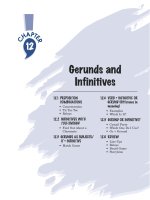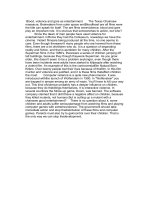Gerunds and infinitives as subjects
Bạn đang xem bản rút gọn của tài liệu. Xem và tải ngay bản đầy đủ của tài liệu tại đây (13.05 KB, 1 trang )
Gerunds and infinitives as subjects
The
subject o
f a sentence is usually a noun or a pronoun. But sometimes,
to-infinitives and –ing forms
are
also used as subjects.
Study the examples given below.
Swimming
is a good exercise.
Here the –ing form ‘swimming’ acts as the subject of the verb ‘is’.
More examples are given below.
Smoking
is injurious to health.
Singing
gives me great pleasure.
Telling
lies can get you into deep trouble.
Collecting
stamps is his hobby.
Driving
very fast on a busy road may lead to an accident.
In each of the following sentences, the subject is an –ing form.
A
to-infinitive
can also act as the subject of a verb.
Study the example sentences given below.
To err
is human.
To give
advice is easy.
To follow
this advice may be difficult.
To swim
in that sea may be dangerous.
To drive
very fast here is not advisable.
Now study the examples given below. They show another kind of subject a sentence can have.
What you say
is not true.
Where the police have taken him
is not known.
Why even good people suffer in this world
is a great mystery.
As you can see, the subject in each of these sentences is not a word or a phrase, but a group of words which
itself looks like a sentence. A group of words of this kind is called
a clause.
Here the clause functions as a noun
and therefore it is called a noun clause.
Be first to know when grammar rules change! Sign up to our newsletter here: englishgrammar.org (It's free)
Powered by TCPDF (www.tcpdf.org)









